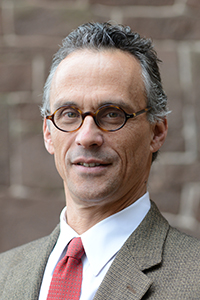President Roth Discusses Liberal Education on Essential Pittsburgh

Are the liberal arts still relevant? President Michael Roth answered this question and more as a guest on “Essential Pittsburgh,” a show on Pittsburgh’s NPR station.
As he argues in his book, Beyond the University: Why Liberal Education Matters, Roth explains, “There’s an American tradition of liberal education that goes back as far as the origins of the country and emphasizes the pragmatic dimensions of broad, contextual study. It’s not so much that you take Latin and Greek or that you study religion rather than, let’s say, biology, it’s that whatever you study, you study it in connection to other things, understanding how what you’re focused on fits into a broader picture. The kind of liberal education that we practice here at Wesleyan, and that I think is part of this great American tradition of liberal education, is a kind of education that connects the specific subject you’re interested in to a range of other possibilities so that you can continue to learn after you graduate from college. The point for me in a liberal education is not what you took when you’re in college but what you’re empowered to do when you leave college.”
Roth was asked about the governor of Kentucky, who has made statements trying to steer students away from studying humanities and toward STEM fields.
“There’s no competition between getting a broad based education and also understanding something in engineering or science. Some of the great scientists have been thinkers who are also steeped in the study of history, in the study of literature or religion. I think it’s a mistake to think that you have to narrow your focus in order to be successful. The more narrow we become, the more likely we are to be irrelevant in the next economic change that happens in the country. So at Wesleyan, I’m starting a design and engineering program, and half of our students are in the sciences, but they’re in the sciences and also studying issues of politics and economics and ethics and entrepreneurship. So that when they get into the business world or the professional world, they have a sense of how people operate and how culture changes, and not just a sense of how machines work. We don’t want to have people graduating from college who can just run somebody else’s machine, we want somebody graduating from college who can run machines but also think of how to invent it or how to use them more fairly or in a more efficient way.”
Asked about the state of higher education today, Roth said: “The defunding of public education in this country is a great, great threat to our future well-being. I think that some of our great public universities no longer get the support from taxation that they used to get, and I think that in the long run will undermine their ability to contribute to commerce and to science and to innovation. I think that some of our very wealthy private institutions should take more of a public responsibility to have graduates who contribute not only to their own well-being but to the solution of some of the most dramatic problems facing us today, be those of poverty, climate change or growing inequality… We have a role in this country to not just train people to do well in their private lives, but to be more open-minded yet critical thinking citizens, more tolerant of their neighbors, more dedicated to their regions, and we have a role to play as academics in reminding students that it’s not just the private life that counts but it’s your public responsibility and your connection to the republic that also counts.”

